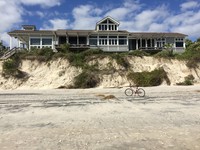

Ponte Vedra Beach residents growled in protest after Billy Zeits, assistant director of the St. Johns County Parks & Recreation Department, told Municipal Service District (MSD) board meeting attendees that a full-blown beach renourishment project would require a study and years of engineering to complete.
“You’re telling me what we can’t do and why,” exclaimed resident Teresa Bennett. “We need to hear what we can do now.”
Zeits and St. Johns County building official Howard White attended the MSD meeting to do just that and summarize the county’s recovery efforts following Hurricane Matthew and address beach dune restoration.
“We’re getting a lot of movement – movement I’ve never seen before,” said White regarding cooperation with agencies like the Department of Environmental Protection (DEP) and the Fish & Wildlife Commission. “But it takes time, and I just ask for your patience. If you go in there like a bull in a china shop, I can promise you there’s nothing that’s going to happen.”
White said the county has completed around 60 percent of the overall damage assessments, and the number of homes tagged as damaged – approximately 3,000 when the assessments first started – has decreased.
The Building Services Division has issued more than 60 permits to residents attempting to shore up their dunes with temporary armoring, White said, which can be as simple as sand bags or as sophisticated as wood sheet pile. The DEP is also issuing emergency permits that allow for more flexibility in the height or material of the armoring, as well as the amount of space it can be set seaward from the structure.
Unless Florida’s emergency proclamation is extended further, residents must apply for these emergency permits by Dec. 2.
Outside of these individual permits, though, the county doesn’t have a comprehensive beach restoration plan, said Zeits to the frustration of the meeting attendees.
“We don’t really know what that would mean,” said Zeits. “We’ve never seen any impacts like this, and we don’t know how we would fund something like that.”
Meeting attendees inquired about state and federal funding, and MSD chairman Gary Jurenovich said the MSD doesn’t qualify because of the priority points that are established for projects like this one. The federal government uses a formula when it pumps sand onto beaches, said Jurenovich, and that formula is based upon the number of public beach accesses and public parking spaces included within the designated area. The Ponte Vedra Beach MSD doesn’t meet the necessary threshold for either category.
Consequently, Jurenovich made a plea to the meeting attendees.
“I need everyone to tell the Board of County Commissioners (BCC) the same story,” he said. “We need the county to help us somehow. You have to write to your congressman/woman, state senators and representatives.”
White made a similar request.
“I think you have Gary as your representative, and then you can add to that by virtue of contacting your BCC members and your local representatives,” said White. “That’s the way it works. But just to demand that the county is going to pay for this tomorrow, that’s not realistic.”
Ryan Carter, vice president of Carter Environmental Services in St. Augustine, also attended the meeting in addition to other private consultants and contractors to discuss a voluntary beach restoration project that is already in progress.
“Do we know if anyone is going to come up with money to do the dune restoration?” questioned Carter. “No. If you want to do something, it has to be voluntary.”
Carter said the county has contracted and granted permission to A.J. Johns Inc., a Jacksonville-based construction company, to use the parking lot at Mickler’s Landing Beach as a staging area to store sand that will then be distributed to individuals’ respective homes to rebuild the dunes.
At the meeting, Carter said only 10 residents had signed up for the project so far, which would make it very expensive for those select homeowners. He suggested that meeting attendees form a committee to own the project, and drive its cost down.
“Who’s championing this dune restoration?” asked Carter. “I’m a private consultant. I’m not paid to do this. You guys need to form a committee as soon as possible. You need to make sure that what dune restoration is being done is competitive.”
Jurenovich said he plans to address dune restoration at the top of each future MSD meeting because it’s that important. He also pledged to speak with the BCC to see what can be done, and he reminded meeting attendees of the severity of the hurricane and just how recently it occurred.
“It just happened to us five weeks ago,” he said. “This is unprecedented. This has never happened to us before.”